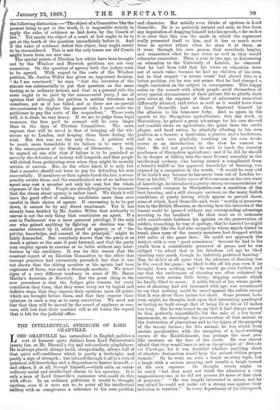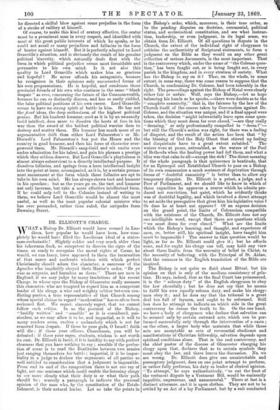THE INTELLECTUAL STRENGTH OF LORD GRANVILLE. L ORD GRANVILLE has naturalized
in English politics a sort of humour quite distinct from Lord Palmerston's jaunty fun, or Mr. Disraeli's dry and sub-sardonic playfulness. He is always placid, always lucid, always kindly, always full of that quiet self-confidence which is partly a birthright, and partly a sign of strength ; but infused through it all is a vein of quizzical self-knowledge and a disposition to banter himself,— and others, if at all, through himself,—which adds an extraordinary social and intellectual charm to his speeches. It is only a man of Lord Granville's eminence who could do this with effect. In an ordinary politician it would be thought egotism, even if it were not so, to point all his intellectual raillery with so conspicuous a reference to his own position and character. But nobOdy even thinks of egotism in Lord Granville. He is so perfectly natural and easy, so free from any imputation of dragging himself into his speech,—he makes it so clear that this was the mode in which the argument really presented itself to him, and it has so much more force as against others when he aims it at them, as it were, through his own person, that everybody laughs, and remembers what he says twice as well as they would otherwise remember. Thus, a year or two ago, in discoursing on education to the University of London, he observed that he had been told that his views on education were not of much value, because he had no children of his own, but in that respect " a recent event" had placed him in a better position, yet he was not aware that he had changed a single conviction on the subject in consequence. This happy satire on the conceit with which people avail themselves of every special circumstance of their private life to glorify their own views at the expense of those of adversaries somewhat differently situated, told twice as well as it would have done if Lord Granville had not thus bantered himself by the allusion to his bran-new baby. And so again in the speech to the Shropshire agriculturists, this day week, at Shrewsbury, he gained a great advantage for his own shrewd and sensible views on agriculture, the game laws, the cattle plague, and local rating, by playfully alluding to his own position as a farmer, a sportsman, a grazier, and a landowner, and in each case playfully touching on his own weaknesses as an introduction to the view he wanted to hint. He did not pretend, he said, to teach the country gentlemen of Shropshire agriculture ; and if he did, he should be in danger of falling into the same literary unreality as the intellectual cockney, who having earned a compliment from a friend's bailiff on his apparent knowledge of farming, was exposed by a companion in the words, " It would be very odd if he hadn't any, because he has never been out of London before in his life." Under cover of this sarcasm on his own want of knowledge, he introduced a pretty strong recommendation of leases,—not common in Shropshire,—as a condition of the best farming, and a still stronger sarcasm on the many foolish conditions of yearly letting which appear to prevail there, some of which, Lord Granville said, were " worthy of preservation in the British Museum, as showing how the interests of the tenant could be ignored without any corresponding advantage accruing to the landlord." He then went on to insinuate with considerable boldness his opinion on the preservation of rabbits, remarking, by way of apology, that he fancied he might be thought like the fool who stepped in where angels feared to tread, since none of the county members had dropped within 100 miles of the game laws. He could not approach the subject with a very " good conscience," because he had in his youth been a considerable preserver of game, and he was obliged " to admit that in his frivolous old age he liked shooting very much, though he infinitely preferred hunting." Nay, he didn't at all agree that the pleasure of shooting was in the search for game ; he liked to fire off his gun even if he brought down nothing, and " he would go even further, and say that the excitement of shooting was often enhanced by meeting with certain little frisky, skipping animals which he hardly liked to name. A noble friend of his, whose quickness of shooting had not increased with age, was accustomed to say that nothing could be urged against the rabbit except that it was about three inches too short. Some present, however, might, he thought, look upon that interesting quadruped as having no fault except that of being 15 or 16 or 17 inches too long. But he was bound to say that it had always seemed to him perfectly unjustifiable,;for the sake of a few hours' amusement, to encourage the preservation of that animal, to the destruction of plantations and to the injury of the property of the tenant farmer ; for this animal, he was afraid, from certain peculiarities, with the exception of a hard-working curate of the Establishment, was perhaps the most prolific creature on the face of the earth. He was almost afraid that they would have to act on the principle of Delenda est Carthago,' for it was doubtful whether anything short of absolute destruction would keep the animal within proper bounds." So he went on, with a laugh on every topic, but a laugh with a serious meaning, and usually a laugh turned at his own expense. He thought woods ought to be rated, " but they must not think the admission a very magnanimous one, as he did not possess 20 acres of that class of property." " He was largely interested in mines, and he was afraid he could not make out a strong case against their inclusion in taxation." In every department of his able speech
he directed a skilful blow against some prejudice in the form of a stroke of raillery at himself.
Of course, to make this kind of oratory effective, the orator must be a prominent man in every respect, and identified with most of the great public interests of which he speaks, or he could not assail so many prejudices and fallacies in the form of banter against himself. But it is perfectly adapted to Lord Granville's situation, and is obviously the result of his genuine political sincerity, which naturally deals first with the form in which political prejudice seems most formidable and persuasive to his own mind. Is it not also this quality in Lord Granville which makes him so gracious and hopeful ? He never offends his antagonists, because he recognizes in their opinions only uncorrected forms of his own prepossessions. He is hopeful, and condemns those pessimist friends of his own who continue in the same "blank despair " as ever, concerning the future of the Commonwealth, because he can so distinctly discern, and has so easily yielded, the false political positions of his own career. Lord Granville seems to have no strong spirit of battle in him. He has not the fixed ideas, the deep enthusiasm, of the highest political genius. But his lambent humour, used as it is by an unusually lucid intellect, does more to dissolve the hosts of foes in his way than the sword of the boldest political warrior does to destroy and scatter them. His humour has much more of an argumentative drift than either Lord Palmerston's or Mr. Disraeli's. Lord Palmerston's fun put the House and the country in good humour, and then his force of character overpowered them. Mr. Disraeli's sang-froid and wit excite even undue admiration for his talent, and gain his phrases a prestige which they seldom deserve. But Lord Granville's playfulness is almost always subservient to a directly intellectual purpose. It dissolves fallacies, and springs from a keen intellectual insight into the point at issue, accompanied, as it is, by a certain permanent amusement at the form which these fallacies are apt to take in his own mind. He has always shown tact and humour in his speeches ; but as the years go on, the tact and humour not only increase, but take a more effective intellectual form. If he could only tall• to the Colonies instead of writing to them, we believe Lord Granville would be almost the most useful, as well as the most popular colonial minister who has ever persuaded, rather than ruled, the antipodes from Downing Street.



































 Previous page
Previous page